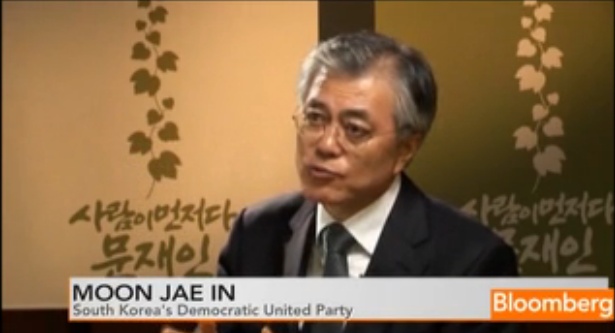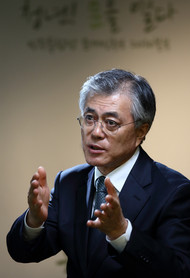Press Release
Moon on South Korean Household Debt, Chaebols
South Korea’s political opposition will unite behind a single candidate for president to stop the ruling party from winning a second five-year term in office, said Moon Jae In, the nominee for the Democratic United Party.
|
Moon Jae In, the Democratic United Party's nominee for South Korea's presidency, speaks during an interview in Seoul on Oct. 9, 2012. Photographer: SeongJoon Cho/Bloomberg |
“I am certain there will be a merger” with the campaign of independent candidate Ahn Cheol Soo, Moon said in an interview at his campaign headquarters in Seoul yesterday. He said he and Ahn share the same values and aims, “at least theoretically.” A spokesman for Ahn said today he won’t make any commitments at this point to a possible merger.
Moon, 59, and Ahn, 50, have both sought to tap public discontent with outgoing President Lee Myung Bak for rising income disparity in Asia’s fourth-biggest economy. A win by one of the opposition candidates in the Dec. 19 vote would augur tougher regulation of chaebols -- the family-run conglomerates that have propelled the nation’s exports -- as well as wider ties with North Korea and an expansion in welfare programs.
“Over the past five years under President Lee Myung Bak, household debt increased by 50 percent, while South Koreans’ real income growth was within a mere 6 percent,” Moon said, in outlining proposals from extending loan maturities for indebted households to higher taxes on the wealthy and stronger protection for small and medium enterprises. Moon pledged to set up an economic coalition with North Korea and to renegotiate parts of a free-trade agreement with the U.S. if he wins office.
Seeking Advantage
“We will never become an obstacle to a change in government by failing to unite and going our own paths,” Moon said, without specifying when he will negotiate the terms of a union with Ahn or what a deal would look like. “It hasn’t been long since Ahn declared his candidacy, so for now we will have to be in this competitive relationship, where we each boost our approval ratings.”
An Oct. 2-5 poll by Seoul-based Realmeter put support for Moon at 22.1 percent, with ruling party candidate Park Geun Hye at 37 percent and Ahn at 28.6 percent. The survey of 3,000 people had a margin of error of plus or minus 1.8 percentage points.
A former human-rights lawyer, Moon was jailed in 1975 for leading street protests against the government of Park’s father, and was then assigned to a front-line position in a special operations unit during his military service. He later served as chief of staff to President Roh Moo Hyun, who was in office from 2003 to 2008. He joined the national legislature after elections in April.
Presidential Field
Park, 60, is the eldest daughter of late dictator Park Chung Hee and is seeking to become South Korea’s first female leader. Ahn is the founder of Ahnlab Inc. (053800), South Korea’s biggest antivirus software maker. The one-time medical doctor and Wharton MBA holder declared his presidential bid on Sept. 19.
Moon said his side would meet with the Ahn campaign to discuss details of a merger. Ahn is “not talking to Moon right now about a coalition nor is he committing at this moment to a merger,” Ahn spokesman Yu Min Yeong said by telephone in Seoul.
Agreement on a single opposition candidate “could then turn into a variable and a force that could overpower Park,” said Jeong Han Wool, director of the Center for Public Opinion Research at East Asia Institute in Seoul.
Moon said a priority for him should he win office is shielding small- and medium-sized businesses by “drastically” boosting the authority of the Fair Trade Commission in its oversight of transactions between chaebols and their suppliers. Moon would also address cross-shareholdings that enable a chaebol chief to be treated like “an emperor.”
Chaebol Policy
Popular opinion toward South Korea’s conglomerates, including the Samsung and Hyundai groups, has soured as the nation’s economic growth slowed and the wealth gap widened. The nation’s richest 20 percent earned 7.86 times more than those in the bottom 20 percent last year, the biggest margin since Statistics Korea began publishing the data in 2006.
While Moon pledged to enact a law banning chaebols from certain industries to protect small businesses, he said that he understood the central role they play in economic development and that he wasn’t hostile to them.
“Reforming chaebols is one of the most important aspects of democratizing the economy,” he said. “But there shouldn’t be anything done to weaken the global competitiveness of chaebols, including Samsung.” Samsung Electronics Co. (005930), the world’s top maker of TVs and mobile phones, reported a record profit last week.
Household Borrowing
Finance Minister Bahk Jae Wan yesterday played down the likelihood of measures to rein in the chaebol. He said in an interview in Seoul that proposals from presidential candidates to take such steps were “nothing more than a ploy to woo voters.” Bahk also said that the nation’s economic slowdown bottomed in the third quarter, and that excess policy stimulus risked “harmful” effects, such as a wider budget gap.
Moon said that household indebtedness had ballooned under Lee’s stewardship, and that the government needed to act before it sparked a “financial crisis.”
South Korea’s household debt rose to a record in the second quarter after borrowing for homes and consumer purchases increased, a central bank report showed on Aug. 23. The sum of home loans and credit purchases rose 10.9 trillion won ($9.8 billion), to 922 trillion won, in the three months through June from the previous quarter.
The increase has yet to derail a rally in stocks, with the Kospi index up about 9 percent so far this year.
The ratio of household debt to gross domestic product “is probably as high as it was during the U.S. financial crisis, which is extremely dangerous,” Moon said. “Many individuals fail to pay back their financial debts and become credit delinquents and banks suffer from that.”
‘Diligent Debtors’
He prescribed lowering interest rates on loans and extending repayment schedules for “diligent debtors.” Financial institutions could also purchase homes from those struggling to pay their mortgages, and then rent them back to the indebted families to ensure they have housing, he said.
The Bank of Korea has cut its benchmark rate once this year, and surprised most analysts at last month’s meeting by leaving it unchanged at 3 percent. Monetary policy makers gather again tomorrow, when 13 of 16 analysts surveyed by Bloomberg News see a quarter-point reduction.
Moon said that setting monetary policy was the sole responsibility of the central bank and that neither the president nor the government should intervene. The central bank “is independent from the government,” he said.
Tax Cuts
Moon said he would put an end to tax cuts for the rich, which he said Lee’s administration had enacted.
“We need to stop reducing taxes for the wealthy, increase tax revenue and reduce government debt,” he said.
Moon said he plans to revisit some of the terms of the free trade agreement with the U.S., which he supported when he served as chief of staff to Roh. He singled out a clause in the agreement that his party has said doesn’t guarantee a fair process for resolving disputes, favoring U.S. and foreign investors over South Koreans.
Moon supports a return to the so-called Sunshine Policy of engagement with North Korea that Lee abandoned. He will “set up an economic coalition with North Korea,” invite officials from the North to his inauguration, and pursue summit talks with leader Kim Jong Un as part of an effort to resume inter-Korean dialogue.
North Korea
Inter-Korean relations have deteriorated during Lee’s tenure, which concludes in February. Tensions peaked in 2010 with the sinking of the South’s warship Cheonan, which killed 46 sailors, and the shelling eight months later of a South Korean border island by the North that killed four people.
Kim, who took control of the totalitarian North when his father died in December, has established his leadership and appears to be more “flexible and open” than his predecessors, Moon said.
The lawmaker said he won’t seek the complete removal of U.S. troops on the Korean peninsula as part of any peace deal with North Korea. The American military is scheduled in 2015 to hand over authority for the control of joint forces in South Korea in wartime.
Moon’s parents hailed from Hungnam in what is now North Korea, and fled during the Korean War to the southern island of Geoje, where he was born. The family was poor, and faced prejudice as refugees from the North. He wrote in his memoir “Destiny” that his family received handouts from a local Catholic church.
Studies Delayed
He studied law at Kyung Hee University in Seoul and graduated eight years after he matriculated in 1972, with his studies delayed by his student activism against the military dictatorship.
Moon married his college sweetheart Kim Jung Sook, 57, a former member of the Seoul Metropolitan Chorus. They have one daughter and one son.
During his military service, Moon participated in “Operation Paul Bunyan,” which U.S. President Gerald Ford ordered in 1976 and involved removing a tree from the Demilitarized Zone that obstructed view of a stretch of the border. An earlier tree-trimming attempt had sparked a violent clash with soldiers from the North that resulted in the deaths of two Americans.
“Moon was physically the weakest but mentally the strongest,” Oh Se Chang, who served in the same battalion with the presidential candidate, said in an interview in Suwon, near Seoul. “After coming back from marching for 60 kilometers carrying 20 kilograms on our backs, Moon would stay up reading all kinds of books he could get his hands on.”

